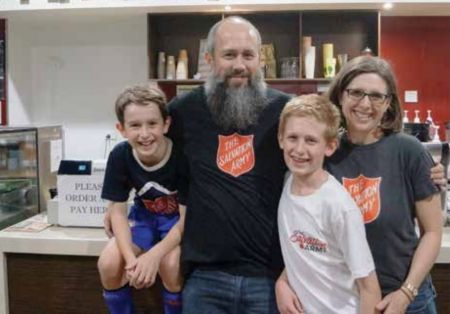An authentic witness

An authentic witness
27 September 2019
Photo: Marcus Spiske
In the formative years of my faith I started to identify ways I could show love to people on the fringe of Salvation Army corps life.
In time, I noticed an older gentleman who had been coming to the evening service for a few weeks. He mostly sat on his own. After chatting to with him I realised that he lived near me, so I offered him a lift home.
For the next few weeks I drove him home then continued on my way. However, on one occasion he invited me in for a cup of tea. I said thanks, but maybe some other time. I never saw him again.
When I think about what that experience would have been like for the man and the courage he would have mustered to ask me inside his place, I can appreciate why he never returned.
Was I willing to enter his world and get to know him, or was the extent of the relationship I was willing to offer limited to a car ride only? Sadly, when we examine our engagement with others there can be many cracks in the authenticity of our witness.
What I have found is that the means is just as important as the end. A Gospel that heralds restored relationship that is proclaimed by someone with a closed heart to others loses its credibility.
In contrast, the Gospel of reconciliation spoken by someone actively involved in the pursuit of peace is heard loud and clear.
Salvation Army founder William Booth suggested there is little use in preaching the Gospel to someone “whose whole attention is concentrated upon a mad, desperate struggle to keep themselves alive”. Why? Because the Gospel speaks of freedom in all domains of our life – the physical, emotional, social and spiritual.
This is what Jesus’ ministry involved – healing and restoration, forgiveness and peace. The proclamation of the Gospel in conjunction with practical, material support for someone ensures the integrity of the message is maintained.
In recent years, there’s been much discussion as to what the future of the church looks like in Australia. As Salvos, we desire to know how best to articulate that vision and what it looks like through the many expressions that make up this movement.
Whatever that future looks like, one thing is sure – if the method doesn’t match the message, nobody’s listening.
In a recent study, Josh Packard, Professor of Sociology at the University of Northern Colorado, asked people why they had left church.
The top four reasons were:
1. People wanted community ... but got judgement.
2. They wanted to affect the life of the church ... but got bureaucracy.
3. They wanted conversation ... but got doctrine.
4. They wanted meaningful engagement with the world ... but got moral prescription.
One thing that stands out is how closely each of these experiences is linked to the tendency for one to exercise power over another.
Judgement, bureaucracy, doctrine and moral prescription all reek of the same sin-stained desire that we have to set up ourselves as better – to be the one with power. In fact, it is so second nature to us that we are often blind to the power dynamics in all our relationships.
When we walk into a corps or area leadership team meeting there are complex dynamics of power in the room. People exhibit power through appointment, through knowledge, as a result of jargon, or because of family connection.
As heralds of the Gospel it’s important for us to work towards a space in which all people are safe, valued, belong, find purpose, are special, and where their voice matters. We need to be aware of the power dynamics in our corps and area leadership team settings.
It doesn’t matter if we are officers, employees, soldiers or community members, our faithful witness in these relationships either gives credibility to our proclamation or strips it completely.
Our experience of ‘doing life together in Goodna’ is that when one can let go of the outcome (resist the desire for power and control) and let God, beautiful things happen in people’s lives.  John Williams with his wife Sharon and sons Thomas (left) and Henry.
John Williams with his wife Sharon and sons Thomas (left) and Henry.
Of all the people to experience transformation of life at Goodna, the majority have experienced that change through relationship – through the connecting of one person to another where they feel safe and valued; where they belong; where they feel special; and where their voice matters.
We see the offering of authentic relationship as a way through which the Gospel is presented. In Luke 10, Jesus told his followers to go out and be willing to ‘enter another’s world’ – to proclaim the Gospel through both word and deed.
Jesus was commanding his followers to do something he was intimately familiar with, having done it himself. Jesus willingly entered our world so that we might know the opportunity to be transformed by love.
I guess this is what the man I dropped home was hoping to see was true.
John Williams leads The Salvation Army mission at Goodna in Queensland.
Comments
No comments yet - be the first.